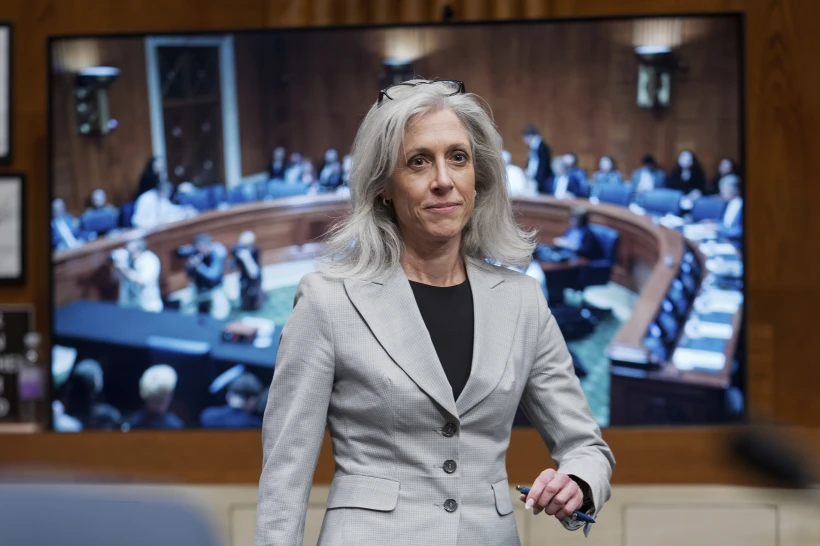Former Centers for Disease Control and Prevention Director, Susan Monarez has testified before the Senate Health Committee.
Monarez, initially handpicked by Health Secretary Robert F. Kennedy Jr and nominated by President Donald Trump, was fired just weeks into the job over disagreements on vaccine policies.
Monarez testified before Senators that Kennedy fired her after she refused to endorse forthcoming vaccine recommendations without reviewing scientific evidence to support the guidance.
The hearing will also undoubtedly serve as an opportunity for Monarez and former Chief Medical Officer Debra Houry, who was also testifying before the committee, to respond to a number of Kennedy’s contentious claims about their final days at the agency.
Monarez was ousted just 29 days into the job, over disagreement with her boss on vaccine policies.
Republican Senator Bill Cassidy, who chairs the powerful health committee Monarez appeared before, expressed skepticism over the explanations Kennedy has given over her firing.
He carefully praised President Donald Trump for his commitment to promoting health among Americans but made it clear he was befuddled by Monarez’s removal. He noted that senators had just approved Monarez’s confirmation with Kennedy praising her “unimpeachable scientific credentials.”
Monarez said in her testimony that Kennedy gave her an ultimatum: “Preapprove” new vaccine recommendations from an advisory CDC panel that Kennedy has stocked with some medical experts who doubt vaccine safety or be fired. She added that he also demanded Monarez fire high-ranking, career CDC officials without cause.
“He said if I was unwilling to do both, I should resign. I responded that I could not preapprove recommendations without reviewing the evidence, and I had no basis for firing. He said he had already spoken with the White House several times.”
Susan Monarez
Kennedy has denied Monarez’s accusations that he ordered “rubber-stamped” vaccine recommendations.He has described Monarez as admitting to him that she is “untrustworthy,” a claim Monarez has denied through her attorney. He did, however, acknowledge during a testy Senate hearing earlier this month that he ordered Monarez to fire several top officials at the CDC.
The Senate hearing is taking place just a day before the vaccine panel starts its two-day session in Atlanta to discuss shots against COVID-19, hepatitis B and chickenpox.
It’s unclear how the panel might vote on the recommendations, though members have raised doubts about whether hepatitis B shots administered to newborns are necessary and have suggested COVID-19 recommendations should be more restricted.
The CDC Director must endorse those recommendations before they become official. Health and Human Services Deputy Secretary Jim O’Neill, now serving as the CDC’s Acting Director, will be responsible for that.
Fired CDC Director ‘Nervous’ About Coming Vaccine Panel Recommendations
Monarez said that she’s “very nervous about” expected guidance to come from the Thursday meeting of the panel that makes vaccine recommendations. “I haven’t prejudged. I don’t know what will happen, but I certainly will be watching,” she said.
In June, Kennedy removed every member of the Advisory Committee on Immunization Practices, the scientific committee that advises CDC on how to use vaccines, and replaced them with a group that includes several anti-vaccine voices. Their votes are expected this week on whether to change recommendations on shots against COVID-19, hepatitis B and chickenpox.
Monarez testified that she was asked by Health Secretary Kennedy to provide “blanket approval” for forthcoming decisions by the CDC’s Advisory Committee on Immunization Practices.
“Tomorrow the reconstituted ACIP will meet. Its composition has already raised concerns from the medical community.
“Based on what I observed in my tenure, there is a real risk that recommendations could be made restricting access to vaccines for children and others in need, without rigorous scientific review. With no permanent CDC Director in place, those recommendations could be adopted.”
Susan Monarez
With the US already facing its worst measles year in more than three decades, she said that the risks posed by fewer people getting vaccinated are “not theoretical.”
READ ALSO: Government Renews Commitment to Revive Railway Sub-Sector























